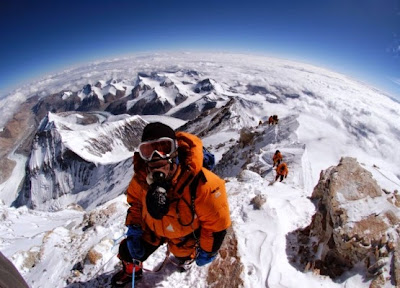Ten Questions you need to ask before you climb Everest
Will i make the top?
Of the hundreds of people that attempt to climb Everest
each year,
only about 30 percent succeed. The
biggest problem
is bad weather, which can trap climbers at Base camp or force
them to turn back.
Do I need to be
fit?
Yes, the route to the summit at 8,848 m (29,028 ft) is over
rock,
snow and ice.However, age is no barrier. The
youngest to
make it was Temba Tsheri, 15, the oldest was Bahadur
Sherchan, 76, both from Nepal.
How long it will
take?
It's impossible to predict, but, from Base Camp, four days
up and
four days down reasonable. The fastest ascent
was by
Italian Hans KammerLander, who got to the top in 16 hours
and 45 minutes in 1996.
What should I take
?
What you take up, you must bring down, so take only the
bare
essentials. There's an estimated 50 tonnes of
rubbish on
Mount Everest, made up of equipment and supplies left
behind - much
of it at Base Camp.
Will it be cold ?
The temperature at summit averages - 36 degrees celsius
(- 33
degrees fahrenheit), but can drop as low as -60
degrees
celsius (-76 degrees fahrenheit) This can freeze the skin
causing frostbite. Toes are the first to suffer, so warm socks
are essential.
What is snow blindness ?
This is when snow reflects the sun ray's and it burns the
back of eyes so you can't see. Sun goggles are essential. They
absorb the harmful UV rays.
What is altitude sickness ?
Above 3,660 m (12,000 ft), oxygen level drops by 40 per
cent and most climbers gasp for breath. To avoid serious
symptoms they need to breathe oxygen from cylinders.
Is the climb risky ?
Yes to date the mountain has claimed many lives.
What's the death zone ?
This the region above 8,000 m (26,246 ft) where there is
only half the normal level of oxygen. Even with oxygen supply.
the body starts to shut down and the slightest exertion takes
tremendous effort.
What's the top ?
From the top of the world you get a unique view over the
Himalayas of Tibet,India, and Nepal. You can see for more
than 160km and even make out the curvature of the earth's
surface.




